

HOT WATER: ‘Erin Brockovich of Uranium’ Exposes the Toxic Legacy of Nuclear Power. Hot Water The world premiere of Hot Water, a new documentary exposing the long-term devastation wrought by uranium mining and the nuclear industry, will launch the 21st annual Environmental Film Festival in Washington D.C.

The film follows the investigative journey of Liz Rogers, the “Erin Brockovich of Uranium,” as she travels around the nation examining the legacy of uranium mining, atomic testing and the creeping danger of contaminated waste in the drinking water of 38 million people. Rogers and her production partner, Kevin Flint, examine the health and environmental impacts of the uranium industry and examine the possibility of a Fukushima type disaster along the California coastline. The film premieres on March 12, two years and one day after the Fukushima disaster. Filmmakers Liz Rogers and Kevin Flint begin in South Dakota witnessing communities overwhelmed by cancer from constant exposure to uranium from local mining interests. Fracking Water: It’s Just So Hard to Clean. Another crack in the “fracking is safe” story for the industry to address.
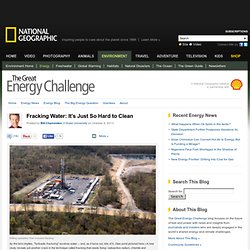
You know that fracking thing? For the uninitiated, hydraulic fracturing (a.k.a. fracking) is the technique of injecting water, sand and chemicals at high pressures into shale and other tight rock formations to release the fuel trapped inside. Combined with horizontal drilling, fracking has allowed us to access huge amounts of heretofore unrecoverable natural gas. What a bonanza: a new and sizable source of natural gas. Pollution: pas plus de deux portions de poisson par semaine. Paris (AFP) – L’agence de sécurité alimentaire (Anses) recommande de consommer deux portions de poisson par semaine, mais pas plus, un équilibre entre nos besoins nutritifs et les risques de contamination au mercure ou aux PCB.
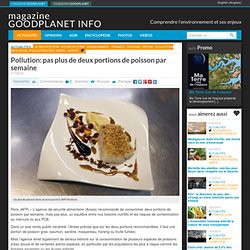
Droit a l'eau / Right to water. Balance Positive. Half of U.S. Rivers Too Sick for Fish to Live in. Given mankind’s propensity to leave a dirty trail in our wake wherever we go, is it really a big surprise to anyone that the veins transporting fresh water crisscrossing the U.S. are increasingly polluted?
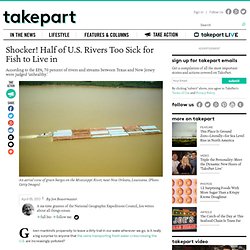
Depends on your level of cynicism. Or realism. But who would have predicted, given the exhaustive Clean Water Act of 1972, the signing of the Wild and Scenic River Act of 1968, and thousands of state laws intended to protect our waterways that a new report from the Environmental Protection Agency would conclude that more than half of American streams and rivers are “sick.” How sick? The EPA’s 2008-2009 National Rivers and Stream Assessment says 55 percent provide “poor conditions for aquatic life.” Water Is Life.
The little, nameless creek tumbling through our hollow holds us in thrall.
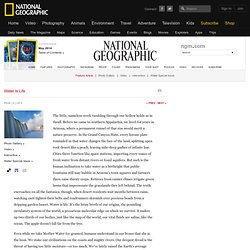
Before we came to southern Appalachia, we lived for years in Arizona, where a permanent runnel of that size would merit a nature preserve. In the Grand Canyon State, every license plate reminded us that water changes the face of the land, splitting open rock desert like a peach, leaving mile-deep gashes of infinite hue. Cities there function like space stations, importing every ounce of fresh water from distant rivers or fossil aquifers. But such is the human inclination to take water as a birthright that public fountains still may bubble in Arizona's town squares and farmers there raise thirsty crops. Retirees from rainier climes irrigate green lawns that impersonate the grasslands they left behind.
International Decade for Action 'Water for Life' 2005-2015. The Privatization of Water: Nestlé Denies that Water is a Fundamental Human Right. The current Chairman and former CEO of Nestlé, the largest producer of food products in the world, believes that the answer to global water issues is privatization.
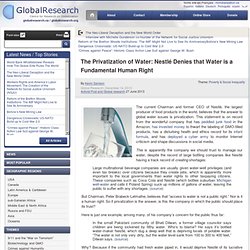
This statement is on record from the wonderful company that has peddled junk food in the Amazon, has invested money to thwart the labeling of GMO-filled products, has a disturbing health and ethics record for its infant formula, and has deployed a cyber army to monitor Internet criticism and shape discussions in social media. This is apparently the company we should trust to manage our water, despite the record of large bottling companies like Nestlé having a track record of creating shortages: Large multinational beverage companies are usually given water-well privileges (and even tax breaks) over citizens because they create jobs, which is apparently more important to the local governments than water rights to other taxpaying citizens.
L'eau, source de tensions accrues entre les pays du Sud. Facts: Water. Water 1 in 10 people lack access to safe water Sanitation 1 in 3 people lack access to a toilet Women & Children Women and children spend 125 million hours each day collecting water Disease Every 90 seconds a child dies from a water-related disease.
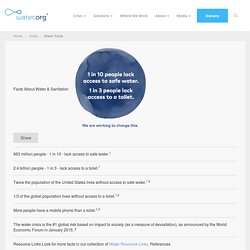
Le bilan en eau de la viande. Mauvais état des lieux pour les eaux européennes. Phosphates dans les eaux. Pollution des eaux douces. Phosphates dans les eaux. Most Polluted Rivers in the World: These Are the Worst 11. Guess What’s Polluting 27 Billion Gallons of Water Each Year? A new and sobering report from Earthworks details just how hard mining is on the environment, especially on our dwindling supply of fresh water.
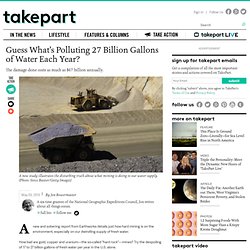
How bad are gold, copper and uranium—the so-called “hard rock”—mines? Try the despoiling of 17 to 27 billion gallons of fresh water per year in the U.S. alone. The annual cost of water treatment by the hard-rock mining industry is a mind-numbing $57 to $67 billion per year. Pollution des eaux douces. Water Is Life. Freshwater 101 Interactive. Help Save the Colorado River You can help restore freshwater ecosystems by pledging to cut your water footprint.
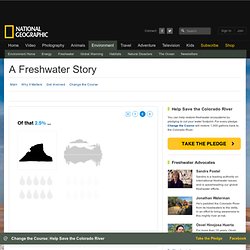
Change the Course. Help Save the Colorado River You can help restore freshwater ecosystems by pledging to cut your water footprint.
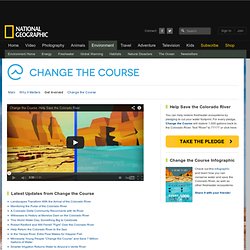
For every pledge, Change the Course will restore 1,000 gallons back to the Colorado River. Text "River" to 77177 or click here: Change the Course Infographic. Pollution des eaux. Global Water Footprint. The world’s population has surpassed seven billion, and that means more people rely on a finite amount of freshwater. The majority of that water is used in agriculture, and in this interactive we take a look at the impact of some of the most important crops produced for U.S. consumption.
In order to better understand water use and availability trends, scientists divide the Earth’s surface into river basins. This feature examines some of the river basins that are the most important from an agricultural perspective. The Hidden Water We Use. Half of U.S. Rivers Too Sick for Fish to Live in. Mauvais état des lieux pour les eaux européennes. Stressed Ecosystems Leaving Humanity High and Dry. Active Citizens , Advancing Deserts , Biodiversity , Climate Change , Energy , Environment , Featured , Food & Agriculture , Global Governance , Headlines , Natural Resources , Poverty & MDGs , Reframing Rio , Water & Sanitation , World A man hauls water at the Chico Mendes landless peasant camp in Pernambuco, Brazil.
Credit: Alejandro Arigón/IPS - Everyone knows water is life. Far too few understand the role of trees, plants and other living things in ensuring we have clean, fresh water. This dangerous ignorance results in destruction of wetlands that once cleaned water and prevented destructive and costly flooding, scientists and activists warn. Pollution des eaux. Mauvais état des lieux pour les eaux européennes. FRANCE, Savines-le-Lac: Une photo prise le 3 Août 2012, à Savines-le-Lac, montre le lac artificiel de Serre-Ponçon, l’un des plus grands d’Europe. La construction du barrage du lac de Serre-Ponçon a commencé en 1955 et s’est achevé en Juin 1960. AFP PHOTO / JOEL SAGET Plus de la moitié des étendues d’eau en Europe sont affectées par des pollutions et des modifications physiques, selon le rapport « Eaux européennes –évaluation du statut et des pressions » de l’Agence Européenne pour l’Environnement (AEE) publié le 14 novembre 2012.
Quant aux modifications physiques, comme les barrages, elles altèrent les habitats et les écosystèmes de 40% des rivières et eaux de transition et de 30% des lacs. Pollution des eaux douces. Phosphates dans les eaux. Irrigation. Irrigation. Vers un monde de rareté en 2025. Deux rapports, commandés par l'association des entrepreneurs français sensibles à l'environnement (EPE), explorent les pistes de nouvelles gestions pour les ressources naturelles et pour l'eau d'ici 2025.
HOT WATER: ‘Erin Brockovich of Uranium’ Exposes the Toxic Legacy of Nuclear Power. Hot Water The world premiere of Hot Water, a new documentary exposing the long-term devastation wrought by uranium mining and the nuclear industry, will launch the 21st annual Environmental Film Festival in Washington D.C. The film follows the investigative journey of Liz Rogers, the “Erin Brockovich of Uranium,” as she travels around the nation examining the legacy of uranium mining, atomic testing and the creeping danger of contaminated waste in the drinking water of 38 million people.
Rogers and her production partner, Kevin Flint, examine the health and environmental impacts of the uranium industry and examine the possibility of a Fukushima type disaster along the California coastline. The film premieres on March 12, two years and one day after the Fukushima disaster. Filmmakers Liz Rogers and Kevin Flint begin in South Dakota witnessing communities overwhelmed by cancer from constant exposure to uranium from local mining interests.
Environnement: les Carpates menacées par la frénésie des centrales hydroélectriques. La rareté de l'eau douce. Traces de médicaments et pesticides dans 10% des eaux en bouteille. Hot Water -Documentary Film. Il faut sauver le fleuve Niger. Depuis quelques années, le fleuve Niger ne finit pas de se rétrécir et cela au grand dam des pays comme le Mali, le Niger, le Burkina, le Tchad etc., qui en sont les principaux bénéficiaires. Le Niger est souvent la seule ressource en eau des populations pour leurs besoins quotidiens, mais aussi pour l'exercice d'activités économiques telles que la pêche, l'agriculture et l'élevage. Mais la survie du fleuve est menacée par le climat d'abord, et par la mauvaise utilisation de ses ressources. Ensuite, la baisse de la pluviométrie, l'ensablement, la pression démographique, les végétaux flottants, les déchets industriels et techniques de productions inadaptées mettent en péril l'existence de ce cours d'eau.
De plus, la navigation et la reproduction des poissons sont quasi impossibles en raison des faibles débits et des plantes aquatiques nuisibles qui colonisent ses eaux. Les lamantins ou vaches de mer sont encore présents le long du fleuve, de même que les hippopotames et les crocodiles. Guess What’s Polluting 27 Billion Gallons of Water Each Year? Most Endangered Rivers. [23-Apr-13] Council of Canadians raises climate change and drought concerns in Nestlé case.
MEDIA RELEASE For Immediate Release April 23, 2013 The Council of Canadians, represented by Ecojustice, submitted an affidavit to the Environmental Review Tribunal (ERT) for a case involving Nestlé’s water takings in Hillsburgh, Ontario. The Council cited concerns about climate change and the lack of groundwater indicators for droughts in the Ontario Low Water Response Plan. Nestlé and Ontario’s Ministry of the Environment have asked the ERT to approve a settlement agreement which would effectively remove any drought-based restrictions on pumping at Nestlé’s well in Hillsburgh.